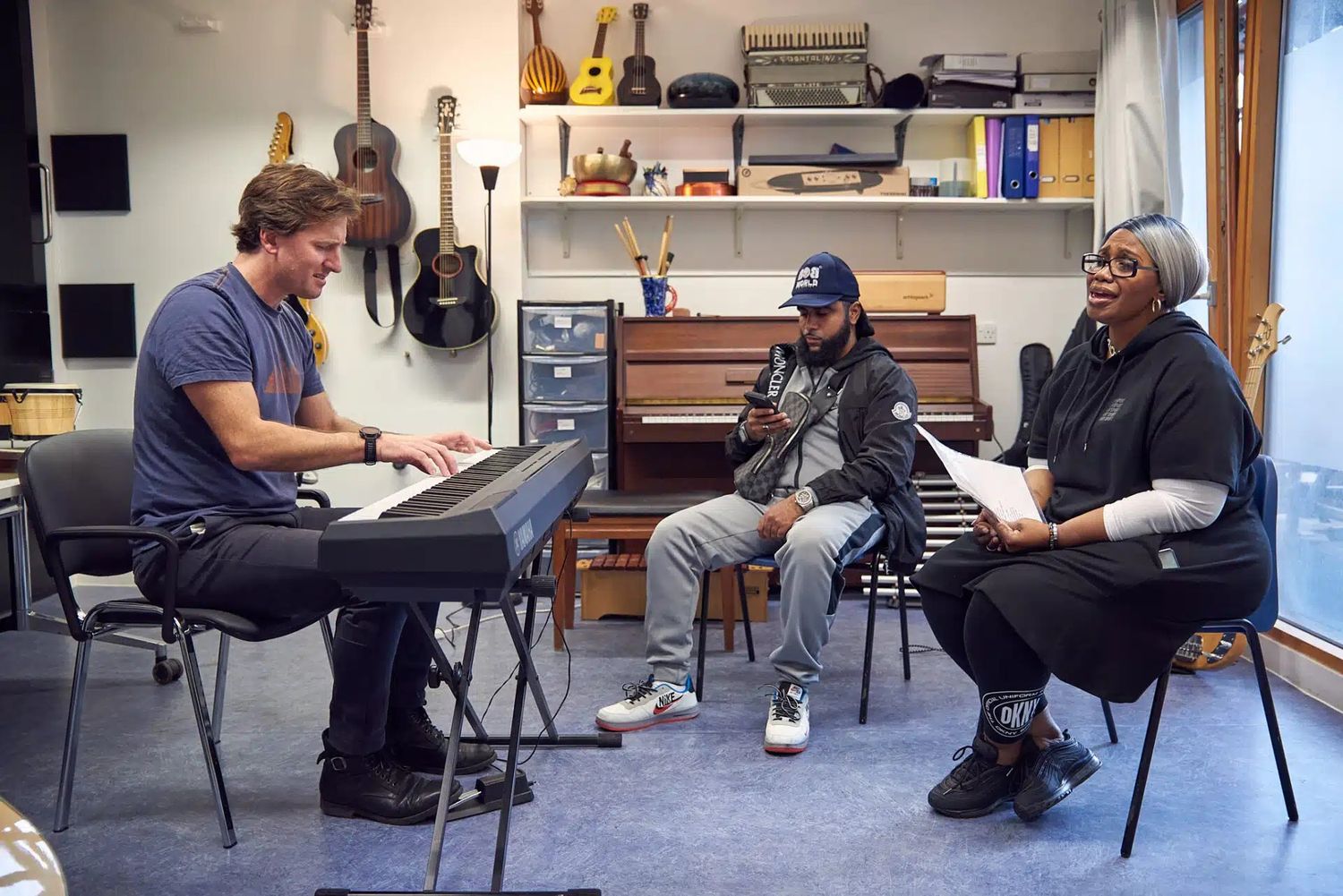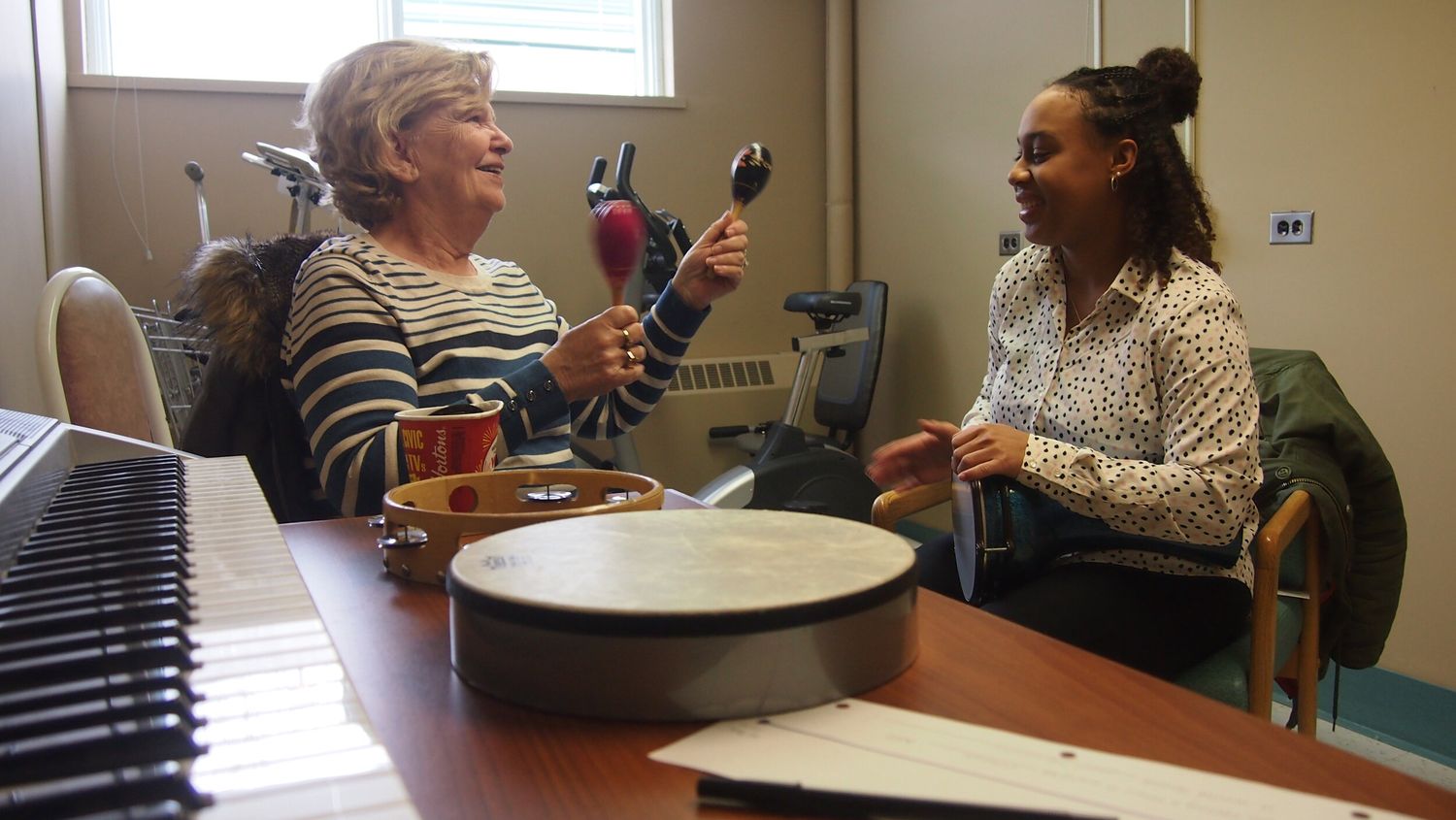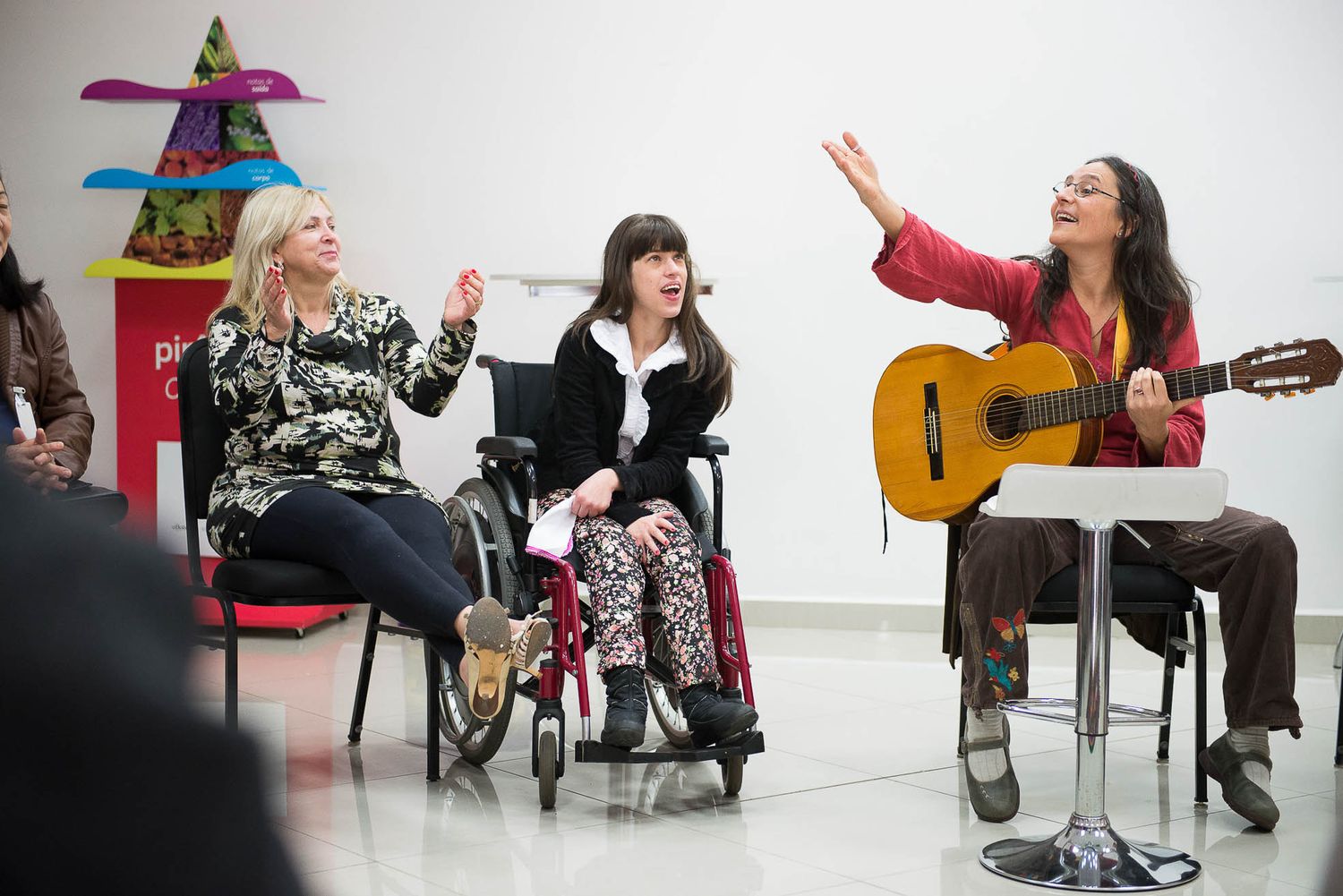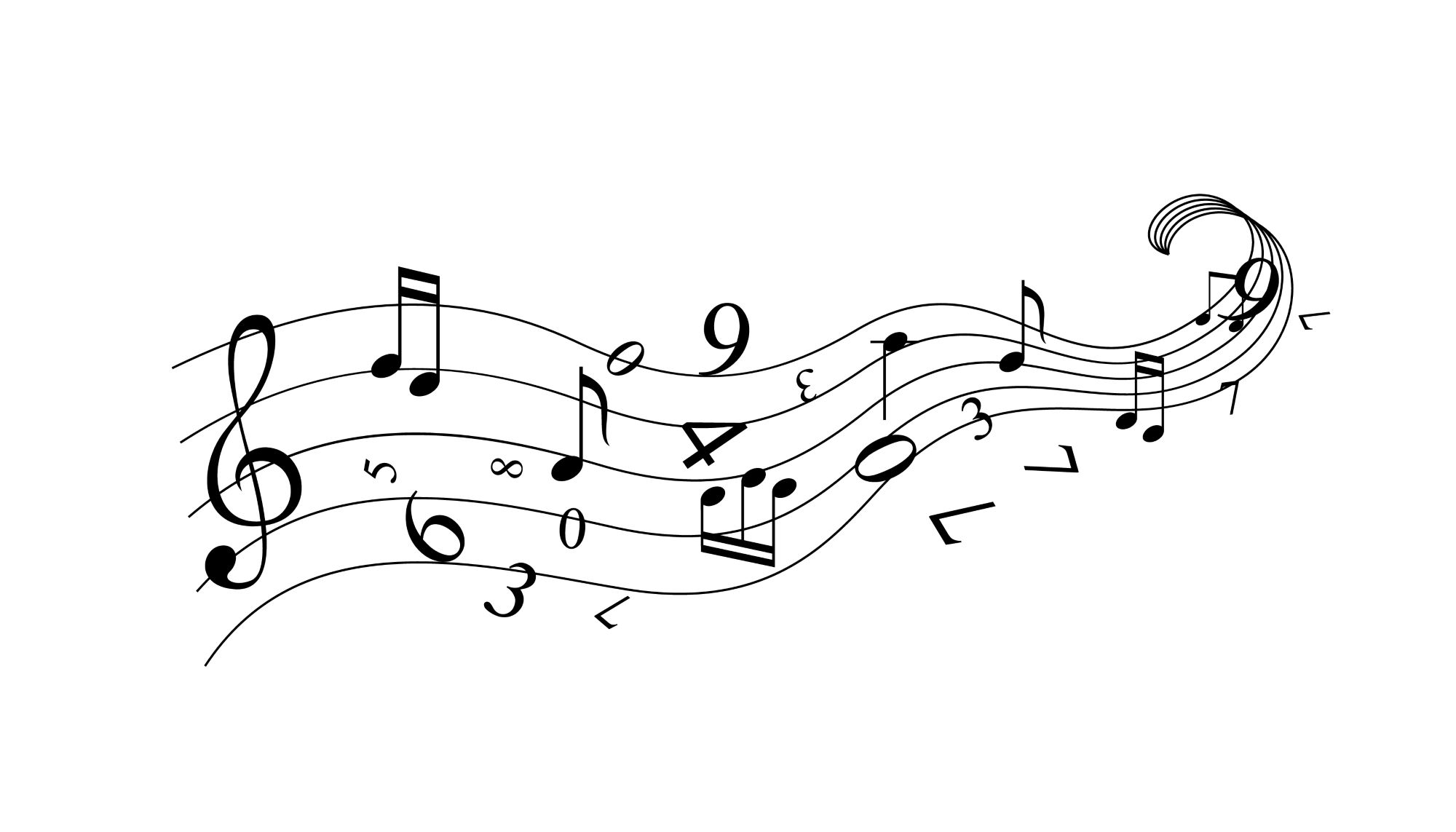Home>Events & Info>Music Therapy>How Does Music Therapy Help Dementia Patients
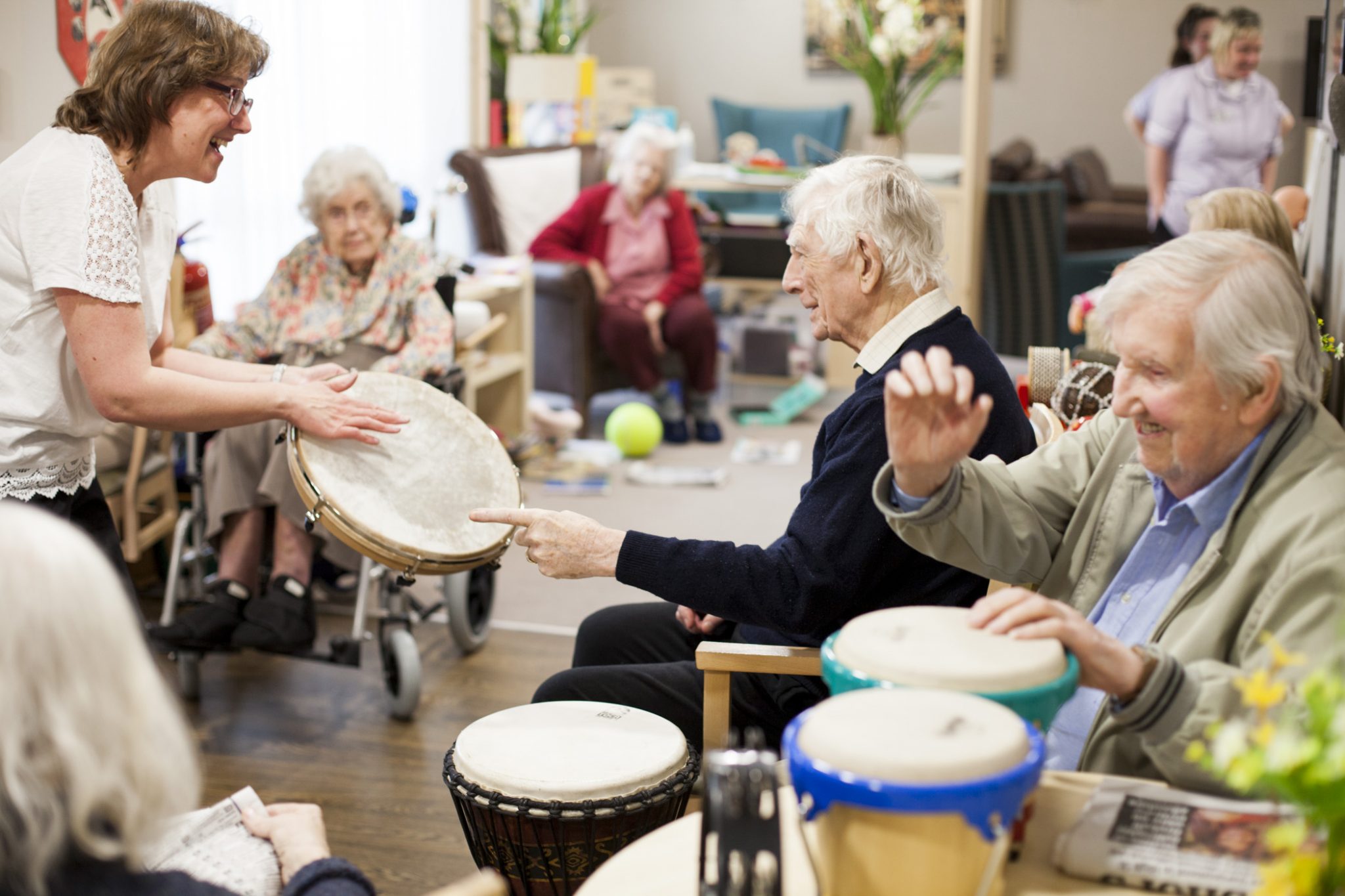

Music Therapy
How Does Music Therapy Help Dementia Patients
Modified: February 2, 2024
Discover the power of music therapy for dementia patients! Learn how music therapy can improve cognitive function, reduce anxiety, and enhance overall quality of life.
(Many of the links in this article redirect to a specific reviewed product. Your purchase of these products through affiliate links helps to generate commission for AudioLover.com, at no extra cost. Learn more)
Table of Contents
- Introduction
- Definition of Music Therapy
- Understanding Dementia
- The Role of Music Therapy in Dementia Care
- Benefits of Music Therapy for Dementia Patients
- How Music Therapy Improves Cognitive Function
- Emotional and Behavioral Impacts of Music Therapy
- Enhancing Social Engagement through Music Therapy
- Implementing Music Therapy in Dementia Care Settings
- Considerations for Music Therapy Sessions
- Conclusion
Introduction
Welcome to the world of music therapy, a powerful and dynamic field that harnesses the healing power of music to support individuals in various aspects of their lives. In this article, we will dive into the fascinating realm of music therapy and explore its profound impact on dementia patients.
Dementia is a progressive neurological disorder characterized by a decline in cognitive function, affecting memory, thinking, behavior, and the ability to perform everyday activities. It can lead to confusion, social withdrawal, anxiety, and frustration, greatly impacting the quality of life for both the individual and their loved ones.
Music therapy offers a holistic and non-pharmacological approach to supporting individuals living with dementia. It taps into the inherent connection between music and the brain, utilizing the power of rhythm, melody, and lyrics to stimulate neural pathways and evoke emotional responses.
In recent years, the practice of music therapy has gained recognition and popularity in dementia care settings, as research continues to highlight its positive effects on cognitive, emotional, and social well-being. By harnessing the universal language of music, music therapists are able to engage and connect with individuals in profound ways, tapping into memories, emotions, and identity.
In this article, we will delve into the role of music therapy in dementia care, exploring its numerous benefits, including improved cognitive function, enhanced emotional well-being, and increased social engagement. We will also discuss the practical aspects of implementing music therapy in a dementia care setting and considerations for conducting effective music therapy sessions.
So, get ready to embark on a journey where the melodies and harmonies of music intertwine with the stories and experiences of those living with dementia, bringing hope, joy, and a renewed sense of self. Let’s dive into the world of music therapy and explore its transformative power in the lives of dementia patients.
Definition of Music Therapy
Music therapy is a specialized field that utilizes the power of music to address physical, emotional, cognitive, and social needs of individuals. It is an evidence-based practice that is conducted by trained music therapists who have a deep understanding of both music and therapy techniques.
Music therapy involves the use of live or recorded music, as well as various musical elements such as rhythm, melody, lyrics, and harmony, to create a therapeutic and supportive environment. The music is carefully selected and tailored to meet the specific needs and goals of each individual, taking into consideration their preferences, cultural background, and therapeutic objectives.
Music therapists work with individuals of all ages and abilities, including those with neurodevelopmental disorders, mental health issues, physical disabilities, and cognitive impairments such as dementia. They use a variety of music-based interventions, including singing, playing instruments, songwriting, improvisation, and music-assisted relaxation techniques, to address specific therapeutic goals.
Music therapy is a non-verbal and non-invasive form of therapy, making it accessible and beneficial for individuals who may struggle with traditional talk therapy or have limited communication abilities. It engages multiple areas of the brain, promoting neuroplasticity and facilitating the development of new neural connections.
Music therapy is different from music listening or music entertainment. It goes beyond passive engagement with music and focuses on utilizing music as a therapeutic tool. The trained music therapist actively engages the individual in musical experiences, creating a safe and supportive environment where they can express themselves, process emotions, and work towards their therapeutic goals.
It is essential to note that music therapy is a regulated profession, and practitioners must adhere to specific ethical guidelines, standards of practice, and professional competencies. Music therapists undergo extensive education and training, including completing a bachelor’s, master’s, or doctoral degree in music therapy, acquiring supervised clinical hours, and obtaining national certification.
In summary, music therapy is a specialized field that uses the power of music to address physical, emotional, cognitive, and social needs of individuals. It is conducted by trained music therapists and involves the purposeful use of music-based interventions to support therapeutic goals and promote well-being.
Understanding Dementia
Dementia is a progressive neurological disorder that affects millions of individuals worldwide. It is not a specific disease but rather an umbrella term that encompasses a range of conditions characterized by a decline in cognitive function severe enough to interfere with daily life. The most common form of dementia is Alzheimer’s disease, accounting for approximately 60-80% of cases.
As dementia progresses, it impacts various cognitive abilities, including memory, thinking, problem-solving, language, perception, and behavior. It can also affect emotional well-being and the ability to carry out daily activities independently.
The exact cause of dementia is often complex and can vary between individuals. It may result from brain cell damage, which disrupts the normal functioning of the brain. This damage can be caused by a variety of factors, such as the accumulation of abnormal proteins, genetic mutations, vascular issues, or a combination of these.
Common symptoms of dementia include memory loss, confusion, difficulty with language and communication, disorientation, impaired judgment, changes in mood and behavior, and a decline in social skills. These symptoms can have a significant impact on the person’s ability to engage in everyday activities, maintain relationships, and maintain their independence.
It is important to approach individuals with dementia with empathy, understanding, and patience. Each person’s experience with dementia is unique, and it is crucial to recognize their individual strengths, preferences, and needs. Providing a supportive and stimulating environment can greatly enhance their overall well-being.
It is also important to remember that dementia does not define a person’s identity or diminish their worth as an individual. They still possess their unique personality, memories, and emotions. Music therapy can play a vital role in connecting with individuals with dementia and tapping into their personal experiences, enhancing their quality of life.
As researchers continue to explore the complex nature of dementia, early diagnosis and intervention have become increasingly important. Early detection allows for the implementation of appropriate care strategies and the opportunity to improve the individual’s quality of life.
Now that we have gained a better understanding of dementia and its impact on individuals, we can explore how music therapy can make a significant difference in their lives by addressing their physical, emotional, and cognitive needs.
The Role of Music Therapy in Dementia Care
Music therapy plays a crucial role in dementia care, offering a unique and effective approach to support individuals with cognitive impairments. By leveraging the power of music, music therapists can create meaningful experiences that address the physical, emotional, cognitive, and social needs of individuals with dementia.
One of the primary goals of music therapy in dementia care is to enhance the individual’s quality of life by providing opportunities for self-expression, connection, and engagement. Music has the ability to evoke memories and emotions, even in individuals with advanced dementia, tapping into preserved neural pathways and stimulating cognitive function.
Music therapy offers a non-pharmacological intervention that can be tailored to meet the specific needs and preferences of each individual. It provides a safe and supportive environment in which individuals can engage in musical activities, such as singing, playing instruments, or listening to personalized playlists.
The therapeutic relationship between the music therapist and the individual with dementia is a key aspect of music therapy in dementia care. The therapist uses their specialized training and techniques to establish rapport, build trust, and create a sense of safety and emotional support. This relationship facilitates the therapeutic process and helps individuals feel valued and understood.
Music therapy can address a variety of goals in dementia care, including improving cognitive function, managing behavioral symptoms, reducing anxiety and depression, enhancing social interaction, and promoting emotional well-being. The rhythmic and melodic elements in music can help with rhythmical cueing for movement and daily activities, aiding in motor skills and promoting independence.
Additionally, music therapy can provide an avenue for self-expression and emotional release. Even when verbal communication becomes challenging, individuals can still express their feelings and emotions through music, allowing for validation and connection.
The social aspect of music therapy is also significant in dementia care. Group music therapy sessions provide opportunities for socialization and connection, reducing feelings of isolation and enhancing social engagement. Through interactive musical experiences, individuals with dementia can connect with others, share in a collective musical experience, and foster a sense of community.
By incorporating music therapy into dementia care, caregivers and family members can also benefit. Music can serve as a bridge for communication between caregivers and their loved ones with dementia, facilitating moments of connection and understanding that may otherwise be challenging to achieve.
Overall, music therapy plays a vital role in dementia care by providing a therapeutic and non-pharmacological approach to address the diverse needs of individuals with cognitive impairments. It offers opportunities for self-expression, emotional connection, cognitive stimulation, and social interaction, enhancing the overall well-being and quality of life for individuals living with dementia.
Benefits of Music Therapy for Dementia Patients
Music therapy has been proven to offer a range of benefits for individuals with dementia. The power of music transcends cognitive decline, tapping into emotional memories and providing a source of connection and joy. Let’s explore some of the key benefits of music therapy for dementia patients:
- Improvement of Cognitive Function: Engaging in music therapy can stimulate various areas of the brain associated with memory and cognition. Music activates neural pathways and can improve cognitive skills, such as attention, concentration, and memory recall. It can also enhance verbal communication abilities, enabling individuals to express themselves in ways they may struggle with in everyday conversation.
- Enhancement of Emotional Well-being: Music has a profound impact on our emotions. It can evoke memories, elicit positive emotions, and provide comfort and relaxation. Music therapy can help reduce anxiety, alleviate feelings of depression, and promote overall emotional well-being. It provides a means of emotional expression and can serve as a source of comfort and joy.
- Reduction of Behavioral Symptoms: Individuals with dementia may experience challenging behaviors, such as agitation, aggression, or restlessness. Music therapy can help calm and soothe these behaviors by providing a structured and engaging activity. The rhythm and melodies of music can promote relaxation, decrease tension, and redirect focus, reducing the frequency and intensity of challenging behaviors.
- Increase in Social Engagement: Music has a unique ability to facilitate social connections. Music therapy provides a shared experience that promotes social interaction and engagement. Group music therapy sessions allow individuals to connect with others, participate in musical activities together, and form new connections. It creates a sense of community and belonging, reducing feelings of isolation and loneliness.
- Enhancement of Physical Functioning: Music therapy can also have physical benefits for individuals with dementia. Engaging in rhythmic activities, such as clapping, tapping, or dancing, can improve motor coordination and mobility. It can also provide opportunities for physical exercise, helping to maintain muscle strength and flexibility.
It is important to note that the benefits of music therapy are unique to each individual. The response to music therapy may vary based on personal preferences, musical background, stage of dementia, and individual needs. Music therapists work closely with individuals and their caregivers to tailor interventions that cater to their specific goals and therapeutic outcomes.
Overall, music therapy offers a multi-dimensional approach to support individuals with dementia. It improves cognitive function, enhances emotional well-being, reduces behavioral symptoms, increases social engagement, and enhances physical functioning. By tapping into the power of music, individuals with dementia can experience a renewed sense of self, joy, and quality of life.
How Music Therapy Improves Cognitive Function
Music therapy has shown remarkable potential in improving cognitive function in individuals with dementia. The rhythmic and melodic elements of music have a unique ability to stimulate various areas of the brain, promoting neural connectivity and enhancing cognitive abilities. Let’s explore how music therapy achieves these cognitive benefits:
Memory Recall: Music has a powerful impact on memory recall. Even in individuals with advanced dementia, music can evoke memories and emotions associated with specific songs or experiences. Music therapy taps into this memory recall by using familiar music from a person’s past to help them access memories and stimulate cognitive function. The songs act as cues, triggering memories and facilitating reminiscence, which can enhance cognitive abilities such as memory retrieval and recognition.
Attention and Concentration: Engaging in music therapy requires focused attention and concentration. By participating in musical activities, individuals with dementia can enhance their ability to sustain attention and focus on specific tasks. The structured nature of music therapy sessions, with rhythm, melody, and lyrics, can help improve concentration and cognitive processing skills.
Executive Functioning: Executive functioning refers to a set of cognitive processes responsible for planning, problem-solving, decision-making, and organizing thoughts. Music therapy can have a positive impact on executive functioning by engaging these cognitive processes in a stimulating and enjoyable way. The complex structure of music, with its multiple layers and harmonies, can challenge individuals with dementia and help exercise their executive functioning skills.
Verbal Fluency: Communication difficulties are common in individuals with dementia. However, music therapy allows individuals to access verbal fluency through singing familiar songs or engaging in improvised vocalizations. Music activates different areas of the brain associated with language processing, helping individuals with dementia improve their ability to articulate words, phrases, and sentences.
Auditory and Sensory Stimulation: Engaging with music stimulates the auditory and sensory systems of the brain. The rhythmic patterns, melodies, and harmonies in music activate these sensory pathways, promoting neural connectivity. This sensory stimulation can enhance cognitive functioning, including auditory processing, perceptual skills, and sensory integration.
Neuroplasticity: Music therapy has been shown to promote neuroplasticity, which refers to the brain’s ability to adapt and change. Engaging in music-based activities and interventions can strengthen existing neural connections and create new connections within the brain. This neuroplasticity can enhance cognitive abilities such as learning, memory, and problem-solving.
It is important to note that the cognitive benefits of music therapy may not be long-lasting, and the effects can vary depending on the individual and the stage of dementia. However, regular and consistent engagement in music therapy sessions can lead to sustained improvements in cognitive function over time.
Music therapy offers a unique and enjoyable way to improve cognitive function in individuals with dementia. By harnessing the power of music and leveraging its impact on memory, attention, executive functioning, and sensory stimulation, music therapy provides a holistic approach to cognitive enhancement in dementia care.
Emotional and Behavioral Impacts of Music Therapy
Music therapy has profound emotional and behavioral impacts on individuals with dementia. The therapeutic use of music can elicit powerful emotional responses and positively influence behavior, contributing to overall well-being and quality of life. Let’s explore the emotional and behavioral impacts of music therapy in more detail:
Emotional Regulation: Music has a unique ability to evoke and regulate emotions. It can elicit joy, calmness, excitement, or nostalgia, depending on the individual and the music being used. Music therapists strategically select music that aligns with an individual’s emotional needs, creating personalized playlists or using live music interventions. By engaging with music, individuals with dementia can experience emotional regulation, finding comfort and stability in the familiar melodies and rhythms.
Reduction of Anxiety and Agitation: Anxiety and agitation are common behavioral symptoms in individuals with dementia. Music therapy provides a soothing and calming effect, reducing anxiety and promoting relaxation. The repetitive and predictable nature of music can help individuals feel safe and secure, easing feelings of restlessness and agitation.
Enhanced Mood: Music has the power to elevate mood and evoke positive emotions. Even individuals who may appear withdrawn or disconnected can experience a shift in mood when exposed to music they enjoy. Music therapists incorporate upbeat and joyful music to create a positive and uplifting atmosphere, fostering feelings of happiness and contentment.
Promotion of Emotional Expression and Communication: For individuals with dementia, verbal communication may become challenging, limiting their ability to express emotions and needs. Music therapy provides an alternative mode of communication, allowing individuals to express themselves through music. Whether through singing, playing an instrument, or using body movements, music therapy encourages and facilitates emotional expression, fostering a sense of validation and connection.
Stimulation of Personal Identity: Music is intrinsically linked to personal memories and identity. Engaging with music from one’s past can evoke a sense of self and promote feelings of identity and belonging. Music therapy allows individuals to reconnect with their personal history, triggering memories and emotions associated with specific songs or genres. This stimulation of personal identity can have a profound impact on emotional well-being and a sense of self-worth.
Promotion of Social Engagement: Music therapy offers opportunities for social interaction and engagement, even for individuals who have difficulty with traditional forms of communication. Group music therapy sessions provide a platform for individuals to connect with others, share in a collective musical experience, and engage in collaborative musical activities. This social engagement contributes to an improved sense of belonging, reduced social isolation, and enhanced overall well-being.
These emotional and behavioral impacts of music therapy in dementia care are highly significant. The ability of music to evoke emotions, regulate behavior, and promote social interaction is unparalleled. Music therapy provides a therapeutic and enjoyable means of addressing emotional needs, reducing anxiety, elevating mood, and enhancing overall well-being for individuals with dementia.
Enhancing Social Engagement through Music Therapy
Music therapy has a remarkable ability to enhance social engagement in individuals with dementia. The power of music transcends cognitive barriers, providing a shared experience that fosters connection, communication, and a sense of belonging. Let’s explore how music therapy enhances social engagement:
Creating a Shared Musical Experience: Music therapy sessions often involve group activities where individuals with dementia come together to engage in musical experiences. The shared musical experience creates a sense of unity and shared enjoyment, breaking down social barriers and fostering a sense of connection among participants. Group members can sing along, play instruments, or move to the rhythm together, forging a shared sense of joy and camaraderie.
Promoting Communication: Music serves as a powerful medium for communication. Even individuals who have difficulty with verbal communication can express themselves through music. Music therapists utilize singing, rhythmic movements, and instrument play to prompt communication and interaction. By engaging in musical dialogues, participants can express emotions, share experiences, and engage in non-verbal communication, strengthening social connections.
Encouraging Active Engagement: Music therapy encourages active participation and engagement from individuals with dementia. Whether it’s clapping along to the beat, singing a familiar song, or playing a musical instrument, active engagement promotes social interaction and stimulates cognitive processes. Actively participating in musical activities empowers individuals with dementia, giving them a sense of agency and contributing to their overall well-being.
Fostering Emotional Connection: Music has a unique ability to elicit emotions and create a deep emotional connection. By engaging in music therapy together, participants can experience shared emotions and a sense of emotional resonance. Music therapists carefully select songs and musical interventions that resonate with the group’s emotional needs, creating opportunities for emotional attunement and empathy. This emotional connection forms the foundation for social engagement and a sense of community.
Promoting Non-Verbal Communication: Music therapy provides individuals with dementia an avenue to communicate and connect through non-verbal means. The use of body movements, gestures, and facial expressions in response to music can facilitate non-verbal communication among participants. This form of communication transcends language barriers and allows individuals to express themselves creatively, deepening social interactions and fostering understanding.
Reducing Social Isolation: Social isolation is a common challenge for individuals with dementia, leading to feelings of loneliness and withdrawal. Music therapy breaks through these feelings of isolation by providing a supportive and inclusive environment. Group music therapy sessions encourage social interaction, create connections, and decrease feelings of loneliness. The sense of belonging and community fostered by music therapy helps combat social isolation and improves overall well-being.
Strengthening Interpersonal Relationships: Music therapy sessions offer opportunities for family members, caregivers, and individuals with dementia to engage in musical activities together. Music can serve as a bridge, strengthening interpersonal relationships and fostering meaningful connections. Through shared musical experiences, family members and caregivers can engage with their loved ones on a deeper level and create lasting memories.
By enhancing social engagement through music therapy, individuals with dementia experience a renewed sense of connection, belonging, and emotional well-being. Music therapy empowers individuals to communicate, interact, and form meaningful relationships, creating a vibrant and supportive social environment that enhances their overall quality of life.
Implementing Music Therapy in Dementia Care Settings
Implementing music therapy in dementia care settings requires careful planning, collaboration, and a person-centered approach. Here are some key considerations to ensure the effective and successful implementation of music therapy:
Collaboration with a Trained Music Therapist: It is essential to partner with a qualified and trained music therapist who specializes in working with individuals with dementia. Music therapists have the necessary knowledge, skills, and expertise to design and implement tailored music therapy interventions. They can assess individual needs, set therapeutic goals, and facilitate meaningful musical experiences.
Assessment and Individualized Treatment Plans: Each person with dementia has unique strengths, preferences, and needs. Prior to implementing music therapy, a thorough assessment should be conducted to understand the individual’s musical background, preferences, cognitive abilities, and emotional needs. This assessment helps form the foundation of an individualized treatment plan, ensuring that music therapy interventions are tailored to meet their specific goals and interests.
Creating a Therapeutic Environment: Designing a therapeutic environment plays a crucial role in the success of music therapy. It should be a safe, calm, and comfortable space that promotes relaxation and engagement. Consideration should be given to factors such as lighting, acoustics, temperature, and accessibility to ensure optimum comfort during music therapy sessions.
Selection of Appropriate Music: Music selection is a vital aspect of music therapy in dementia care. It should be based on the individual’s personal preferences, cultural background, and therapeutic goals. Familiar songs and music from their younger years often evoke strong emotional responses and memories. The music therapist may conduct interviews with family members to gather information about the individual’s musical history and preferences to create personalized playlists or music interventions.
Regular and Consistent Sessions: Consistency is key when it comes to music therapy. Regular sessions, ideally held at the same time and day each week, help establish a routine and provide familiarity. The frequency and duration of sessions may vary based on the individual’s needs and abilities. Regularity allows for a deeper connection between the individual, the music therapist, and the music itself, and increases the potential for therapeutic outcomes.
Involvement of Caregivers and Family Members: Caregiver involvement is essential for the success of music therapy in dementia care. Family members and caregivers should be encouraged to participate in music therapy sessions to strengthen relationships and create shared experiences. Music therapists can also provide education and support to caregivers, teaching them how to use music in daily caregiving routines to enhance communication and reduce behavioral symptoms.
Evaluation and Adaptation: Regular evaluation of music therapy interventions is necessary to assess progress and make adaptations as needed. The music therapist will monitor the individual’s response to music therapy, adjust interventions, and modify treatment plans to ensure ongoing effectiveness. Evaluation may involve outcome measures, observations, and feedback from caregivers and family members.
Interdisciplinary Collaboration: Music therapy should be integrated within an interdisciplinary approach to dementia care. Collaboration with other healthcare professionals, such as doctors, nurses, psychologists, and occupational therapists, can ensure a comprehensive and holistic approach to the individual’s care. Sharing information, goals, and observations can help create a cohesive and coordinated approach to the individual’s overall well-being.
By considering these elements and implementing music therapy in a person-centered and collaborative manner, dementia care settings can harness the transformative power of music to improve the quality of life, emotional well-being, and social engagement of individuals living with dementia.
Considerations for Music Therapy Sessions
When planning and conducting music therapy sessions for individuals with dementia, several important considerations should be taken into account. These considerations ensure that sessions are meaningful, safe, and tailored to meet the specific needs of each individual. Here are some key considerations for music therapy sessions:
Individualized Approach: Each person with dementia is unique, and their preferences, abilities, and needs should guide the planning and implementation of music therapy sessions. Music therapists should conduct thorough assessments and create individualized treatment plans that take into account the person’s musical background, cultural influences, cognitive abilities, emotional needs, and therapeutic goals.
Flexibility and Adaptability: Individual responses to music may vary from session to session, so flexibility and adaptability are essential in music therapy sessions. Some days, an individual may be more responsive and engaged, while on other days, they may show less interest or energy. The music therapist should be flexible in adjusting the session’s pace, content, and approach to meet the individual’s needs during each session.
Providing Choices and Autonomy: Allowing individuals to make choices and have control over their music therapy experience can empower them and enhance engagement. Offering choices in song selection, instruments to play, or types of musical activities promotes a sense of autonomy and personal agency. The music therapist should incorporate the individual’s preferences and seek their input throughout the session, promoting a sense of ownership and involvement.
Sensory Considerations: Individuals with dementia may have sensory sensitivities or limitations. The music therapist should be mindful of sensory considerations such as lighting, noise levels, and the overall sensory environment. Adjustments can be made to accommodate individual sensory needs, such as using softer instrument sounds, providing headphones for personalized listening, or ensuring a quiet and calming space for relaxation during music therapy sessions.
Cultural Sensitivity: Cultural backgrounds and musical preferences vary among individuals, and it is important to be culturally sensitive in music therapy sessions. Music therapists should strive to incorporate culturally appropriate music, taking into account the individual’s cultural background and musical heritage. This fosters a sense of familiarity, identity, and connectedness during the sessions.
Emotional Support and Validation: Music therapy sessions can evoke powerful emotions in individuals with dementia. The music therapist should create a safe and supportive environment that welcomes and validates those emotions. Emotional support should be provided through active listening, empathetic responses, and acknowledging and reflecting the individual’s emotional experiences. This helps individuals feel understood and can encourage emotional expression and connection.
Maintaining a Structured Routine: Individuals with dementia often benefit from a structured routine. Music therapy sessions should have a clear structure and predictable sequence of activities, providing a sense of order and familiarity. Establishing a routine for music therapy sessions helps individuals feel secure and attuned to the session’s flow, enhancing their ability to engage and participate.
Monitoring and Adjusting Interventions: Through ongoing observation and assessment, the music therapist should continuously monitor the effectiveness of interventions and make necessary adjustments. Observations of the individual’s responses to music, changes in behavior, and progress towards therapeutic goals guide the music therapist in tailoring interventions to meet the individual’s evolving needs and preferences.
By considering these important factors, music therapy sessions can be thoughtfully designed and implemented to maximize the benefits and impact for individuals with dementia. The individualized and person-centered approach of music therapy ensures that sessions are tailored to each person’s unique needs and experiences, fostering a supportive and transformative environment for their well-being.
Conclusion
Music therapy is a powerful and transformative approach in supporting individuals with dementia. It harnesses the intrinsic connection between music and the brain to address physical, emotional, cognitive, and social needs. Through the meaningful and intentional use of music, music therapy provides a source of comfort, connection, and joy for individuals living with dementia.
By engaging in music therapy sessions, individuals with dementia can experience a range of benefits. The therapy enhances cognitive function, stimulates memory recall, and promotes emotional well-being. It also reduces anxiety, agitation, and behavioral symptoms, while increasing social engagement and quality of life.
Implementing music therapy in dementia care settings requires collaboration with trained music therapists, individualized treatment plans, and the creation of a therapeutic environment. Regular and consistent sessions, involvement of caregivers and family members, and interdisciplinary collaboration are also vital components for successful implementation.
Considerations for music therapy sessions include personalization, flexibility, sensory and cultural sensitivity, and maintaining a structured routine. These considerations help ensure that sessions are tailored to meet the specific needs and preferences of each individual, fostering a sense of ownership, autonomy, and emotional support throughout the therapy process.
In conclusion, music therapy offers a transformative and person-centered approach to support individuals with dementia. By tapping into the power of music, music therapists create a safe and engaging environment for individuals to express themselves, connect with others, and rediscover their sense of self. The emotional, cognitive, and social benefits of music therapy enhance the overall well-being and quality of life for individuals living with dementia, bringing joy, comfort, and a renewed sense of purpose in their journey.

